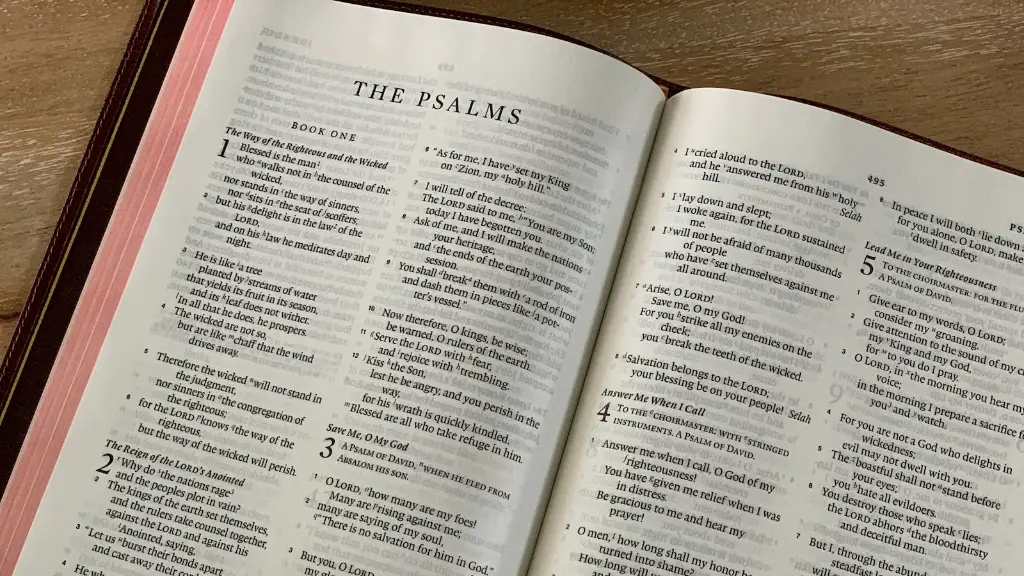In the core of Christianity, many teachings are based on symbolism, which is why the number seven has a special meaning within scripture. Seven is the fourth prime number, so it’s no surprise that the Bible has bestowed a great significance on it. In Christianity, the seven most commonly accepted references to the number seven are the seven days of creation, the seven lamps of the menorah, the seven seals, the seven heavens, the seven trumpets, the sevenfold gifts of the Spirit, and the seven parables of the Kingdom.
The first indication of seven in scripture is in the book of Genesis, which speaks of the seven days of creation. As God created the world, he created light separated it from darkness and then, in the fourth day of creation, he put the sun and moon in place and called it the fourth day. Here, the concept of the seven-day week is believed to have originated. Humans began to use and interpret this time-based pattern with the purpose of dividing work and resting periods, and thus seven came to be seen as a sign of rest and completion. By resting on the seventh day, God was also demonstrating that humankind should embrace rest as part of their daily lives.
Another reference to seven can be seen in the vision of God’s throne in the book of Revelation. Whereas Hebrew scriptures mention a seven-branched candelabrum, the New Testament speaks of seven lamps of fire burning before the throne of God. These are symbols of God’s everlasting presence and protection of His people. Additionally, the seven lamps have functioned as the primary symbol of light and enlightenment throughout both the Old and New Testaments, serving as an ongoing reminder of the Holy Spirit’s ever-presence in the life of believers.
In the book of Daniel, seven seals are placed on a scroll to protect its contents. As each seal is opened, a further understanding of certain truths related to God’s wrath and mercy is revealed. Additionally, the seven seals are thought to correspond to the seven trumpets in the book of Revelation, which are blown to signify God’s judgment upon the world. These judgments will bring about a new era in the life of the earth and its people, a period characterized by happiness, justice and peace.
The New Testament also speaks of seven heavens, each of which are connected with a particular realm or realm of influence. Generally, these seven heavens represent the desire of believers to maintain a relationship with God and to strive for a spiritual transformation in order to fulfill their highest potential as His children. Furthermore, Christ’s seven-fold gifts of the Holy Spirit are given to believers as a special grace and are used to both guide and empower the faithful in their spiritual journey.
In the Bible, the number seven is also associated with the sermons or teachings of Jesus Christ. He teaches seven parables that contain hidden truths to those who recognize them. These parables are intended to guide readers in the right direction, leading them away from evil and toward a greater understanding of eternal truths. By understanding and engaging in Jesus’ teachings, believers can be transformed and reassured of their place in God’s plan.
The Bible also mentions seven feasts and other numbers of special significance, such as the twelve disciples, the four gospels, the three persons of the Trinity, the two Great Commandments, and other important numbers. Combined, these numbers help believers to understand more deeply the importance of God’s love and perfect will for their lives.
The Significance of Seven in Pythagorean Philosophy
In ancient Greece, the number seven was taken to have great importance in Pythagorean philosophy. To both the Pythagoreans and Plato, seven is the highest number of perfection and is associated with a celestial order, giving it a greater and more spiritual significance. Pythagoreans believed that seven was the symbol of Intelligence, Happiness and Wisdom. According to them, the perfect life had four divisions, and the seventh day was the day of rest and judgement. Thus, seven came to be seen as a sign of divine order and human life.
Throughout Greek mythology and literature, seven is also connected to fertility and the natural growth cycle of the seasons. This varied with the culture, but almost all believed that the number seven was associated with some kind of divine energy or power that needed to be acknowledged and respected. It is this spiritual energy that is believed to have established the foundations of seven as a symbol of order and balance.
The Significance of Seven in Hinduism and Buddhism
The number seven is significant in both Hinduism and Buddhism. In Hindu literature, the number seven symbolizes Dharma, the cosmic order of the universe. In Buddhism, seven appears in many forms, all of which are related to the idea of spiritual enlightenment. The “Buddha’s Seven Steps of Enlightenment” are the seven stages that a soul passes through when it is released from the cycle of rebirth and finds inner peace.
In Hinduism, the seven most sacred Chakra points are believed to be connected with the spiritual universe. The Chakra points represent the seven spiritual laws that guide the path of enlightenment, and the number seven also symbolizes the seven paths of yoga. When these paths are followed, it is believed that a spiritual transformation is possible.
The Significance of Seven in Ancient Chinese Culture
In ancient Chinese culture, the number seven is an omen of good luck and happiness. The Chinese believe that the number seven is an auspicious number, as it symbolizes the seven heavens and seven earthly realms. Seven is also associated with the seven directions, and in Chinese astrology it is represented by the star constellation, known as the Big Dipper or the Seven Stars of Heaven.
In Chinese feng shui, a Taoist system of geomancy, the number seven is associated with luck and protection. Thus, many buildings are designed to include Seven Lucky Gods or the Seven Immortals. Also, many buildings and temples contain seven lucky coins, which are believed to bring good luck and ward off evil spirits.
The Significance of Seven in Freemasonry
The number seven is prominent in Freemasonry, too. In the European Masonic tradition, seven is one of the most important figures. The seven-pointed star is a Masonic symbol, and it is believed to represent the seven Spirits of God. A seven-pointed star is found on the flag of the United States, in France and on some Masonic lodges. Additionally, the seven liberal arts and sciences, which include grammar, logic, rhetoric, arithmetic, geometry, music, and astronomy, are also believed to have been included in the symbol of the seven-pointed star.
The number seven is also related to the initiation process in Masonic lodges. Each initiate progresses through seven grades, which symbolize the progression of spiritual transformation. The seven grades represent a journey from moral blindness to one of moral understanding in order to achieve perfection. Thus, the number seven symbolizes an unending journey to moral transformation and spiritual enlightenment.
Conclusion
It is clear that the number seven has a deep significance in several different cultures and religions, from Christianity to Hinduism and Freemasonry. In Christianity and other religions, seven represents the seven days of creation, the seven lamps of the menorah, the seven seals, the seven heavens, the seven trumpets, the sevenfold gifts of the Spirit, and the seven parables of the Kingdom. In Pythagorean philosophy and Greek mythology, the number seven signifies perfection, fertility, and the natural growth cycle of the seasons. In Hinduism, seven symbolizes Dharma, the cosmic order of the universe, and in Buddhism, it is associated with Buddha’s seven Steps of Enlightenment. Moreover, it is related to luck and protection in ancient Chinese culture, and to moral transformation and spiritual enlightenment in Freemasonry. These varied interpretations of the number seven reveal its universal significance, which is why it continues to strongly resonate with us even today.




